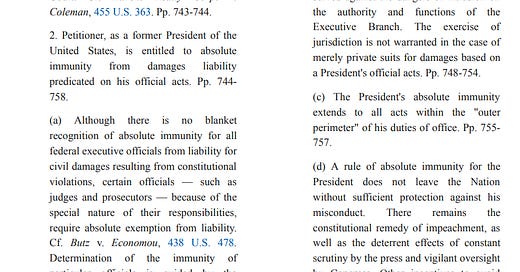How will Scotus rule on Trump immunity claim?
I expect a ruling that Trump is entitled to immunity
I listened to the oral argument before the Supreme Court of the United States in New York v Trump where the issue was whether a President, in this case Trump, is immune from prosecution for alleged criminal conduct for acts taken while holding the office of President. The court benefited from excellent argument on both sides by competent and well-prepared counsel, one side arguing for no right to immunity for Trump from criminal prosecution for acts taken while in office and in particular for his alleged role in the January 6 events and the other arguing that the principle is the issue, not the specific facts of the case. The Court seemed divided if you can read anything into the questions they put to counsel for both sides. I did not conclude there was an actual division, just justices asking important questions that an audience can fear were evidence of prejudgment when they were not.
A lot of time was spent discussing the thinking in Nixon v Fitzgerald where the Supreme Court held the President had “absolute immunity” from damages liability predicated on his official acts. I am always impressed by the clarity of Supreme Court decisions in United States and Fitzgerald was no exception.
The important guidance from the Fitzgerald case is in paragraph 2 (a) where the Court notes that certain officials such as judges and prosecutors require absolute immunity from liability because of the special nature of their responsiblities, and it is plain and obvious the same logic would apply to the office of President. Equally important, the Court recognized the rule of absolute immunity they found in Fitzgerald did not leave the Nation without sufficient protection against misconduct given the constitutional remedy of impeachment.
Counsel for New York argued that impeachment was a high threshold and a weak protection without much in the way of historical precedent in reigning in acts of past Presidents. In my opinion, that argument was fatal to Jack Smith’s hopes since it should be common to all sides that the bar for conviction of a President for misconduct while in office should be a very high one, or President’s will become cannon fodder for opposing politicians to frustrate their effectiveness in office or weaken their ability to gain re-election.
The New York v Trump case is about criminal prosecution, not civil liability. President’s are called upon to make life and death decisions some of which would have the elements of criminal conduct - declaring a war on Iraq based on fabricated “weapons of mass destruction” intelligence; ordering the drone strike to kill the leader of a terrorist group not an imminent threat against United States; or, being accused of accepting bribes (such as Biden has been in recent years) all comprise areas where the Presidency can be disrupted or the President compelled to face a jury for acts alleged but not proved with incumbent distraction and risk of incarceration.
The framers of the Constitution created three co-equal branches of government. While Trump is an individual, it is equally possible that acts of Congress can be alleged to be criminal (war crimes sanctioned by Congress, for example) or acts of members of the Supreme Court. Opening up these officials or bodies to criminal prosecution for acts taken within the “outer limits” of their authority creates chaos, not order, an id an invitation to mischief rather than a barrier to misconduct.
Impeachment, clumsy as it may be, is the right remedy. If a President’s misconduct is significant, Congress has the ability to convict and impose appropriate sanctions including removal from office. The checks and balances of the impeachment process work to ensure fairness to both the Nation and the accused official. Putting the issue before a jury of ordinary citizens reduces has the potential for perverse outcomes driven by political bias or lack of sophistication of jurors, or rulings by lower court judges that end up cluttering up appeal courts for years while the official prosecuted is distracted from the important role they play in governing.
I have confidence in the U.S. Supreme Court. Justices appointed by both Democrat and Republican presidents demonstrated their competence in grappling with the important issues in this case and in the outcome may well disagree on the approprite ruling, but no one should conclude that disagreement is driven by a political bias rather than a thoughtful concern that the ruling they issue not be a barrier to effective government.
In my opinion, extending the logic from Fitzgerald from civil liability to criminal prosecution is a small step and the arguments for or against immunity are in common.




What BS. Anyone who had watched the trump speech knows there's no insurrection.
Anyone who follows the story of civilians being prosecuted for just walking in with video showing the guard literally invited them in knows there's no insurrection.
Fbi congressional hearings, the releases of j6 tapes.....all proven beyond any reasonable doubts there's no insurrection.
History taught us there's no such thing as insurrection without gun powder.
81 millions votes my arse.
TRUMP: “I think we have a good chance of winning New York. We're going to give it a big play. We’re going to the South Bronx to do a rally. We’re going to be doing a rally at Madison Square Garden, we believe.”
A post on X :
“Why bother doing rallies where u already are winning? Go to the Bronx. Go to Atlanta right outside the prison and walk the streets. Go to Philly, Detroit, etc. Take the fight right to em.”